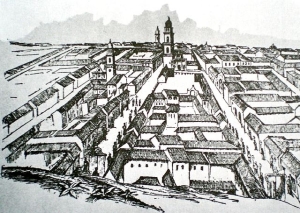No matter where you stand on the issue of climate change, there is no doubt that nature and climate have an effect on history. Blizzards, tsunamis, earthquakes, volcanic eruptions, tornados, floods, avalanches, hurricanes. Mother Nature throws a variety of disasters at us, and one thing all these natural occurrences have in common is that we, as mere humans, have no control over them
Research about natural disasters give us a number to represent lives lost, and as I’ve mentioned before, without any of the stories of those lives, that number can be incomprehensible. I see that The Great Flood of 1931 in China had a death toll of anywhere from 800.000 to 4,000,000. How can we even begin to make sense of either of those numbers?
But with any natural disaster there are costs other than the initial loss of life: population displacement, destruction of infrastructure, loss of agriculture and property, fractured economies and the illnesses and deaths from disease after the actual event.
There are many examples that I could use to show how natural disasters affect history, but I chose the earthquake of 1812 in Caracas, Venezuela. Because this happened over 200 years ago, some of the information is a little sketchy. But as I asked in last week’s spy post, would it really make any difference if we knew all the facts for sure and nothing was speculation?
On March 26, 1812, on Maundy Thursday, the Thursday before Easter, at about 4:00 in the afternoon, an earthquake of an estimated magnitude of 7.7 on the Richter scale hit Caracas and the surrounding area. There was also a second quake in Merida within a 30 minute period, probably along a second, separate fault line. For comparison purposes, the 2010 earthquake in Haiti was a magnitude 7.0
Records say that 10,000-20,000 people died, which some reports say was 90% of the population. There were reports of whole buildings being swallowed by the earth, churches full of people celebrating the holy day collapsing, and Caracas being flooded with dirty water. A new lake was created and a river was dammed. The destruction was incredible.
As if a natural disaster wasn’t bad enough, new problems were created in the aftermath. Agriculture was destroyed, so there was little available food. Infrastructure was destroyed, so basic services were no longer in place and crime became rampant, especially by those trying to get access to the available food. There were also no services to remove the deceased, so the survivors had to deal with disease.
Those are the basic things we know about what happened during and after this earthquake. Even without having concrete proof of the exact number of people who died or were displaced, we have a basic understanding that the city and much of the surrounding area was destroyed.
That is enough, of course, to change history. But wait, there’s more. Venezuela had begun the long and violent process of ending their time as a Spanish colony and becoming an independent republic. On July 5, 1811, almost nine months before the earthquake, Venezuela declared their independence from Spain.
Caracas was solidly in the hands of patriots to the cause of the republic. When nature destroyed this area, the royalists and the Church were quick to give their interpretation of events. They claimed that the earthquake was divine punishment for the rebellion against the King of Spain. After all, the earthquake didn’t destroy any areas held by the royalists. Many fighting on the side of the republic believed these claims and deserted the cause to change sides. They believed the religious interpretation that they were being punished for going against their natural ruler, rather than the scientific explanations of the patriot government. Royalist forces took control of Caracas in August 1812
The fight for independence from Spain was eventually won in 1821. I have to wonder how many lives might not have been lost in this long fight if there had been no earthquake, no natural disaster to turn the tide back to the royalists for this period of time.
And before we start feeling superior about how gullible those patriots were to believe they were being punished for their rebellion, we need to look at some of the spin that we believe. Two centuries from now, will people be laughing at how gullible we are?


